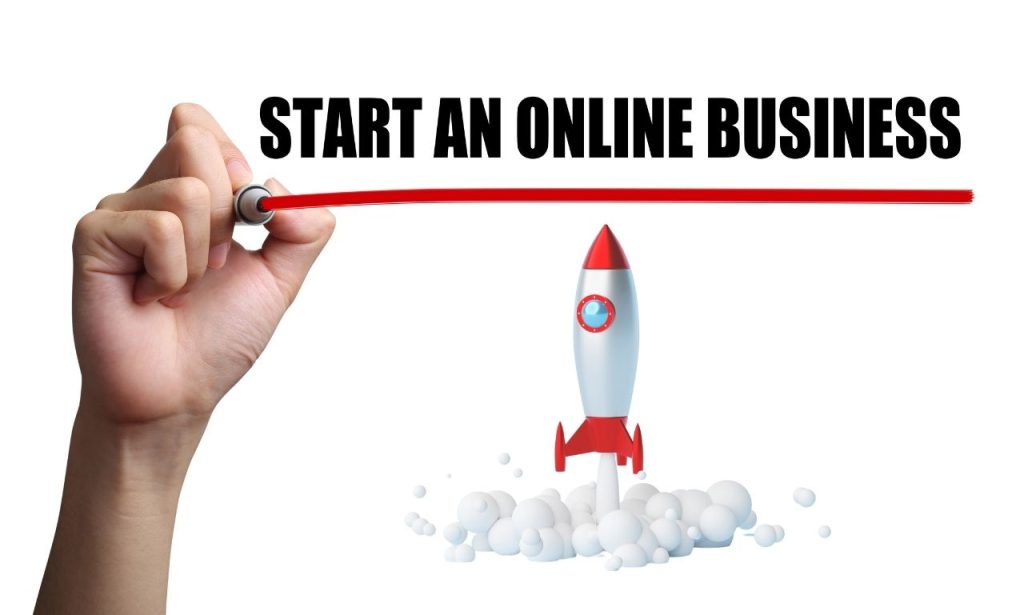Starting an online business has never been more accessible than it is today. The digital landscape offers endless opportunities for entrepreneurs with vision. You don’t need a massive investment or a physical storefront. All you need is a solid idea and the right approach. I’ve helped countless entrepreneurs build successful online businesses from scratch. My experience has taught me what works and what doesn’t in the digital marketplace. This guide will walk you through the steps I use with my consulting clients. You’ll learn how to validate your idea, set up your business legally, and launch with impact. The online business world moves fast, but these fundamentals remain constant. Let’s explain how to start an online business in eight actionable steps.
Assess the viability of your new business idea

Not every business idea is worth pursuing. I learned this lesson the hard way. You need to figure out if people actually want what you’re selling. Start by asking yourself what problem you’re solving. The best businesses fix real headaches for customers. My friend Jake thought he had a brilliant app idea. He spent months developing it. When he launched, nobody downloaded it. Why? He never checked if people needed his solution.
How to perform market research
Market research sounds fancy, but it’s really just homework about your customers. Talk to people who match your ideal customer profile. Ask them about their challenges. Watch what they complain about online. Join Facebook groups where your potential customers hang out. Read the comments section on your competitors’ posts. Use Google Trends to see if interest in your idea is growing or shrinking. Send out simple surveys using Google Forms. I once discovered a $50,000 product feature just by asking ten customers what they struggled with. The answers are out there if you listen.
Develop a business plan
Your business plan doesn’t need to be complicated. Think of it as a map for your journey. Write down what you’re selling and why people should care. Figure out how much money you need to get started. Identify who your customers are in specific terms. List your biggest competitors and what makes you different. Set clear goals for your first 30, 60, and 90 days. My first business plan was just three pages long. It wasn’t fancy, but it kept me focused when things got tough. Update your plan as you learn more about your market. A flexible roadmap beats no direction at all.
Choose a business name
Your business name matters more than you might think. It’s often the first thing people learn about your company. Pick something that’s easy to say, spell, and remember. Check if the domain name is available before settling on your choice. Search the trademark database to avoid legal troubles later. Ask friends if they can recall your name after hearing it once. Test how it looks on business cards and social profiles. I once rebranded a client’s business, and their traffic jumped 40% overnight. The new name just connected better with their audience. Don’t rush this decision.
Decide on your business structure
Your business structure affects your taxes, paperwork, and personal risk. Sole proprietorships are the simplest option but offer no personal protection. LLCs protect your personal assets if something goes wrong with the business. Corporations provide the strongest protection but require more paperwork and compliance. Partnerships work when you have co-founders with skills you lack. I started as a sole proprietor to keep things simple. Later, I switched to an LLC when the business grew. Talk to a tax pro before deciding. Their fee will save you money in the long run.
Take care of all the legal tasks

Legal stuff isn’t sexy, but skipping it can kill your business. Register your business name with your state. Get an EIN (Employer Identification Number) from the IRS website. Open a separate bank account for your business. Never mix personal and business money. Check if you need special permits for your industry. Get basic business insurance to protect yourself from surprises. Set up a simple accounting system from day one. I use QuickBooks, but FreshBooks works great for beginners. These steps might seem boring, but they create a solid foundation for growth.
Build your website and choose your sourcing and fulfillment methods
Your website is your digital storefront. It needs to look professional and work flawlessly.
Decide how to build your website
You have several options for creating your website. Website builders like Shopify or Wix make it easy for beginners. WordPress gives you more control but has a steeper learning curve. Custom development costs more but delivers exactly what you want. Focus on making your site mobile-friendly since most people shop on phones now. Make sure it loads quickly. Customers bail after just a few seconds of waiting. Include clear buttons telling people what to do next. Make your contact info visible on every page. I’ve built sites all three ways. For most starters, Shopify or WordPress with a premium theme works perfectly.
Choose your domain name and hosting platform
If possible, your domain name should match your business name. Buy related domains to protect your brand from copycats. Choose a hosting company known for good uptime and customer support. Cheap hosting often means slow loading times and frustrated customers. Set up professional email addresses using your domain. Using gmail.com for business looks amateur. Install SSL security to protect customer information. I recommend Namecheap for domains and SiteGround for hosting. They’ve been reliable for my clients for years. Good hosting isn’t the place to pinch pennies.
Plan your sourcing and fulfillment strategy
How you get products and deliver them matters hugely. Dropshipping means no inventory but lower profits per sale. Making your own products gives you higher margins but requires more startup cash. Print-on-demand works well for custom designs without inventory hassles. Digital products like courses or software can be sold infinitely without physical production. Figure out how you’ll ship products and handle returns before launching. Calculate all your costs carefully before setting prices. I started with dropshipping to test products, then moved to custom manufacturing once I knew what sold well. Your fulfillment strategy can evolve as you grow.
Develop and implement your prelaunch marketing strategies
Marketing isn’t something you start after launching. It begins months before. Create content that helps your target customers solve problems. Build an email list by offering something valuable for free. Set up social profiles on platforms where your customers actually spend time. Don’t try to be everywhere. Connect with people who might share your products with their audience. Install Google Analytics to track where your visitors come from. Plan your content calendar for the first three months. I helped a client generate $12,000 on launch day through careful pre-launch marketing. They spent six weeks warming up their audience before asking for a single sale.
Test and launch your new business
Never launch without testing everything first. Ask friends to place test orders on your website. Try your checkout process with different payment methods. Check how your site looks on phones, tablets, and computers. Process a few sample orders completely to find bottlenecks. Soft launch to a small group before announcing to the world. Have a plan for handling technical problems on launch day. Collect feedback constantly and fix issues quickly. Your launch is just the beginning, not the finish line. My first launch was a mess because I skipped proper testing. Learn from my mistake.
Why start an online business?
Online businesses offer unique advantages over traditional brick-and-mortar stores.
Flexibility
I start work at 10 AM because that’s when my brain functions best. Some of my team members work nights. Others take Wednesdays off. Online business gives you this freedom. You can work from home, coffee shops, or beach resorts. Parents can be present for school events. Caregivers can schedule around family needs. You build your schedule around your life, not the other way around. This flexibility kept me going during the tough early days. The ability to control your time is worth more than money. Traditional jobs rarely offer this level of freedom.
Low startup costs
My first online business cost $600 to launch. A similar physical store would have needed $50,000+. You don’t pay for retail space, store fixtures, or utilities. Many tools offer monthly subscriptions instead of big upfront costs. You can test ideas cheaply before going all-in. Start part-time while keeping your day job for security. Grow at your own pace as profits allow. These low barriers mean that almost anyone can try entrepreneurship. You don’t need rich parents or venture capital to get started online. Smart hustlers can bootstrap their way to success.
Global reach
My smallest client sells specialty tea to customers in 43 countries. Their physical shop would be limited to local foot traffic. Online, your potential customer base is worldwide. You can sell to people while you sleep. Target specific countries through focused advertising. Use translation tools to communicate across language barriers. Find profitable niches that are too small to support a local store. The internet eliminates geography as a limiting factor. Small brands can connect with their perfect customers anywhere. This global potential creates opportunities impossible in traditional retail.
Scalability

When physical stores grow, costs typically grow at the same rate. Online businesses can scale much more efficiently. You can double sales without doubling expenses. Automation handles repetitive tasks as you grow. Digital products sell to unlimited customers without additional production. You can start solo and add team members strategically as needed. Your systems can handle sudden traffic spikes during busy seasons. I’ve watched one-person shops grow into multi-million-dollar operations. The ceiling is much higher online than with traditional business models.
Conclusion
Establishing an online business does not demand excessive complexity, although proper planning remains essential. These eight steps serve as a tested path for people to follow. Waiting to perform market research represents the initial step before making any significant financial expenditure. Establish the legal structure at the beginning to prevent future difficulties. Most online businesses that achieve success did not become successful immediately. Their growth resulted from continuous work and dedicated attention to their customers. Your initial execution will probably contain errors. The process requires learning and adjustment before continuing forward. Persistent effort delivers better rewards than perfect execution in the online business domain. The chance to be free and the opportunities outweigh the difficulties you will face. Are you prepared to create an ownership project?
Also Read: How Working From Home Can Change Your Life
FAQs
Most online businesses can launch with $500-$2,000 depending on your business type and industry.
With today’s user-friendly platforms and tools, basic computer skills are enough.
With consistent effort and smart marketing, most businesses see profit within 6-12 months.
No, start part-time while keeping your job for financial stability.
Use content marketing, social media, SEO, and targeted ads to reach your ideal customers.


